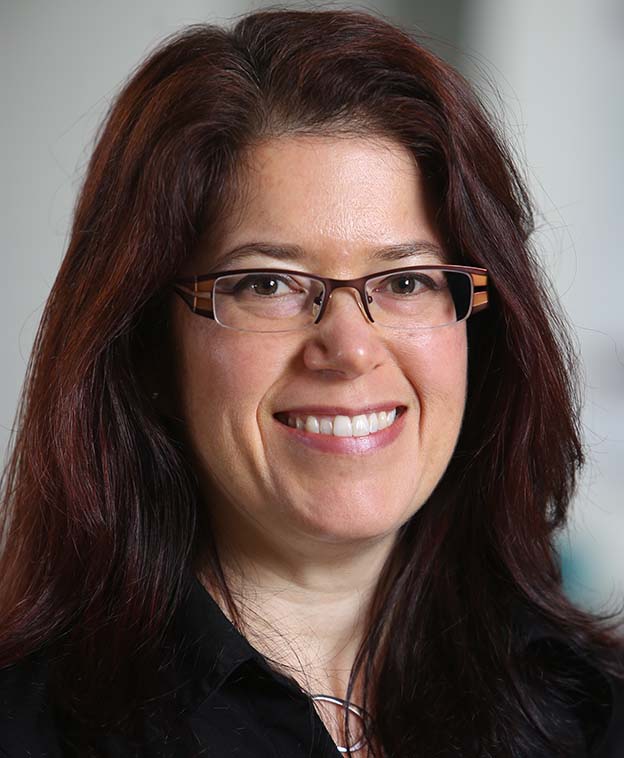The future is now: Pippa Lock on flipped classrooms and blended learning

Keynote speaker, assistant professor and 3M National Teaching Fellow Pippa Lock: 'We anticipate future support for the development of online courses and hopefully for additional blended learning courses.'
Put on your maroon thinking caps — the McMaster Symposium on Education & Cognition is taking place on campus this week.
The three-day affair is designed to help bridge the gap between the lab and the classroom. Attendees will discuss how cognitive principles can inform post-secondary instruction, while examining other critical issues in education.
Pippa Lock, an assistant professor in the Department of Chemistry and 3M National Teaching Fellow, is one of the keynote speakers. Ahead of her speech on Wednesday evening, “Blending Instincts, Practice and Research to Create Constructive Interactions,” Lock offered some thoughts on the future of flipped classrooms, blended learning and advances in teaching and learning at McMaster.
In a general sense, talk about the value of the McMaster Symposium on Education & Cognition, and how it positions the University as a leader in this field?
Reflecting on the 2013 symposium, I see value in this event as a vehicle to provide attendees with exposure to a variety of ideas about memory, learning and educational practices, and to stimulate discussion and brainstorming of research ideas and implementation of new practices.
Looking back on the last 15 years, what has been the most significant change to teaching and learning at a post-secondary level?
A significant change has been the evolution of instructional technologies. For example, 15 years ago in Burke Science Building Room 147 there were chalkboards, a large screen and overhead projectors. Now, there is a SMART podium, document camera, ability to project from a laptop, iClicker receiver base, cellphones and pretty much any software you wish. Add Internet access and the tools that can therefore be retrieved, to include animations, simulations and video clips, and there is a smorgasbord of options for creative ways to support learning.
Is the traditional classroom still a useful space or resource?
Yes. The opportunity to interact as part of a real-time learning community in a space that allows emotional connection is incredibly valuable.
Is face-to-face learning still important?
In many respects, yes. Face-to-face interaction is especially critical for hands-on tasks where trouble-shooting can take place while a task is being performed (e.g. an experimental technique in a lab). For many learning tasks, the opportunity to interact live — while reading emotion, tone and body language — provides an enhanced interaction which is challenging to emulate in the online environment. The spontaneity that is possible in the face-to-face connection can provide an important basis for memorable learning.
For students beginning their post-secondary journey this fall, what sort of resources do they expect in this digital age?
In the Faculty of Science, students will encounter a greater number of classes offered in a blended learning format, and this is likely to continue to increase. In addition to the existing introductory psychology courses, our introductory chemistry course (Chemistry 1A03) will be a flipped classroom model, supported by blended learning. One first-year biology course will also be offered as a blended course, and a first-year physics course is now under development for next year. The web modules that are part of our introductory chemistry course will be accessible for students to view 24/7, allowing greater accessibility and the option to replay and review modules, in addition to the viewing being self-paced. This will greatly support accessibility.
Although not new, many resources are available online to support students academically and personally. For example, in Chemistry 1A03 we use McMaster’s online course learning management system, Avenue to Learn, for communication of news, discussion of questions, archive of resource material and virtual office hours.
How is McMaster positioned to meet these needs?
At McMaster, we have excellent support from provost David Wilkinson and from MIIETL to generate financial and technical support for the development of blended courses. In the Faculty of Science, we have had strong support for these initiatives from the office of the associate dean (Academic) and the dean’s office, and technical expertise from the Science Media Lab. We anticipate future support for the development of online courses and hopefully for additional blended learning courses.
Can you offer a comment on the efforts of David Shore and Joe Kim, in terms of making this symposium happen?
I extend my congratulations to David and Joe on their educational leadership in initiating the McMaster Symposium on Education & Cognition last year, and their commitment to its continuation. This symposium provides an excellent opportunity for faculty and students to access a great spectrum of invited speakers from Canadian and U.S. institutions.
The McMaster Symposium on Education & Cognition runs Aug. 13-15. View the full schedule of events here.
